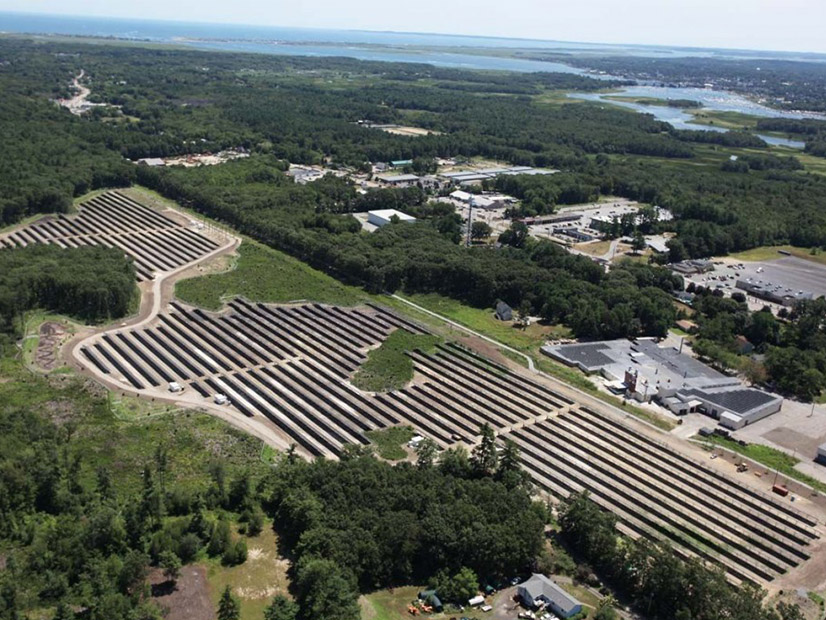ISO-NE COO Vamsi Chadalavada on Thursday presented updates on the RTO’s 2021 Annual Work Plan to the NEPOOL Participants Committee, including the addition of a project to address the removal of the minimum offer price rule (MOPR) from the capacity market.
The MOPR requires a minimum price for new resources entering the Forward Capacity Market (FCM). Significant concerns have been raised at both the regional and federal levels that its application precludes state-sponsored resources from clearing the FCM.
FERC has identified this matter as a priority; Chair Richard Glick said at the commission’s technical conference on capacity markets in March that MOPR is not “sustainable” because it is frustrating state decarbonization efforts. (See PJM MOPR in the Crosshairs at FERC Tech Conference.)
Chadalavada said the rule’s elimination must be consistent with maintaining reliability, which is the primary goal of the FCM. He added that ISO-NE intends to develop a proposal with input from stakeholders to address the dual objectives of allowing sponsored resources to clear and maintaining competitive capacity pricing.
According to Chadalavada, work on the MOPR is a top initiative and is expected to ramp up in the second half of this year. He anticipates the need to file a proposal with FERC in the first quarter of 2022, which will require targeted efforts by the RTO and all stakeholders.
In a memo to the RTO, the New England States Committee on Electricity (NESCOE) said that “it would be helpful to understand any work ISO-NE has done to date” on the MOPR, including “any particular impediments” that could result in an additional capacity auction under the current construct.
“Given the expiration of the renewable technology resource exemption and [Competitive Auctions with Sponsored Policy Resources’] functionality, the next auction is of heightened concern,” NESCOE wrote. “We encourage ISO-NE to communicate and work with states and stakeholders early in the development of the range of potential near-term approaches. We look forward to the discussion and working with you and NEPOOL toward a timely resolution on this important issue for the New England states.”
Five Advance to Next Interview Round for Board Positions
A summary of the Joint Nominating Committee (JNC) meetings held on April 8-9 and 16 said that five candidates emerged from a pool of nine to secure second-round interviews for two upcoming vacancies on the ISO-NE Board of Directors.
Chair Kathleen Abernathy and Director Phil Shapiro will retire on Oct. 1.
The profiles of the candidates selected include:
- part-time adviser for a utility infrastructure consulting company and former interim CEO of an electric utility company;
- adviser to the CEO of a technology services company and former utility innovation strategist;
- independent consultant focusing on policy studies and analysis for a range of institutions;
- managing director of a financial services leadership coaching firm and former banking executive; and
- former transitional utility CEO with a varied energy background.
Second-round interviews will be scheduled for mid-May dates with the five candidates.
Following the second day of first-round interviews, the JNC noted the absence of Vickie VanZandt, who is retiring from the board in 2022. The JNC said VanZandt’s input would help better evaluate the technical skills of those candidates with transmission backgrounds. ISO-NE attorney Maria Gulluni said VanZandt, with her extensive transmission background, could join the JNC in a non-voting capacity to interview candidates during the next round.
The JNC comprises seven board members, NEPOOL’s six sector leaders, and a New England Conference of Public Utilities Commissioners representative. With input from the board, state representatives and market participants, the committee identifies the types of expertise that ensure ISO-NE has “sufficient knowledge and expertise to act as the RTO for New England,” according to the Participants Agreement between ISO-NE and NEPOOL.
Energy Market Value down
ISO-NE’s energy market value for April was $229 million (through April 28), down $144 million from the updated March valuation and $69 million higher than the same month in 2020, according to Chadalavada’s monthly report to the PC.
April natural gas prices were 31% lower than in March. Average real-time hub LMPs were 22% lower than in March, at $26.19/MWh. Average natural gas prices in April and real-time hub LMPs were up 43% and 45%, respectively, from the same period last year.
Average day-ahead cleared physical energy during peak hours as a percentage of the forecasted load was 99.8% in April, up from an adjusted 98.9% during March, with the minimum value for the month of 94.6% posted April 4.
Daily uplift or net commitment period compensation (NCPC) payments totaled $2.6 million over the period, up $400,000 from the adjusted March value and $500,000 more than April 2020. NCPC payments were 1.1% of the energy market value.
Chadalavada said that 17 new projects totaling 5,283 MW applied for an interconnection study — five battery storage projects, seven battery and solar co-location projects, one solar project and four offshore wind projects — with in-service dates in 2021 to 2027. ISO-NE is currently tracking 288 generation projects, which total approximately 31,102 MW.





